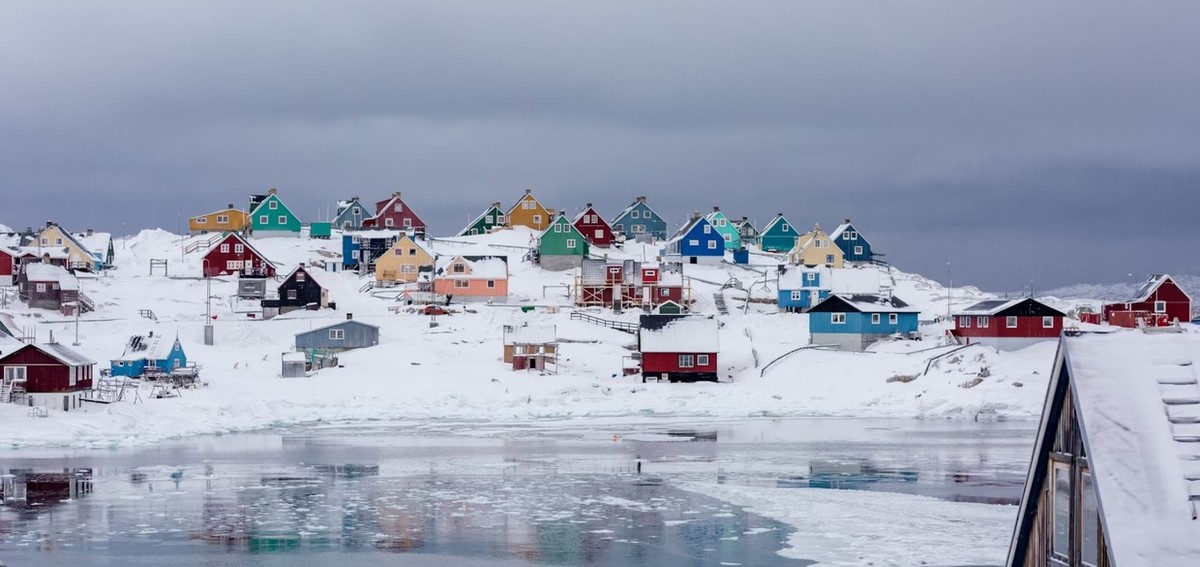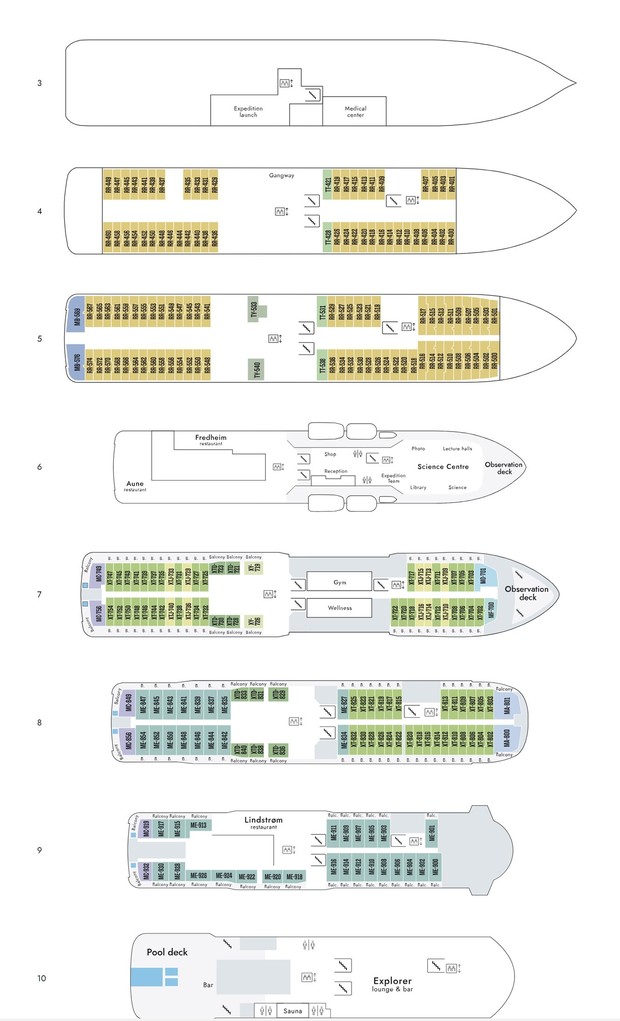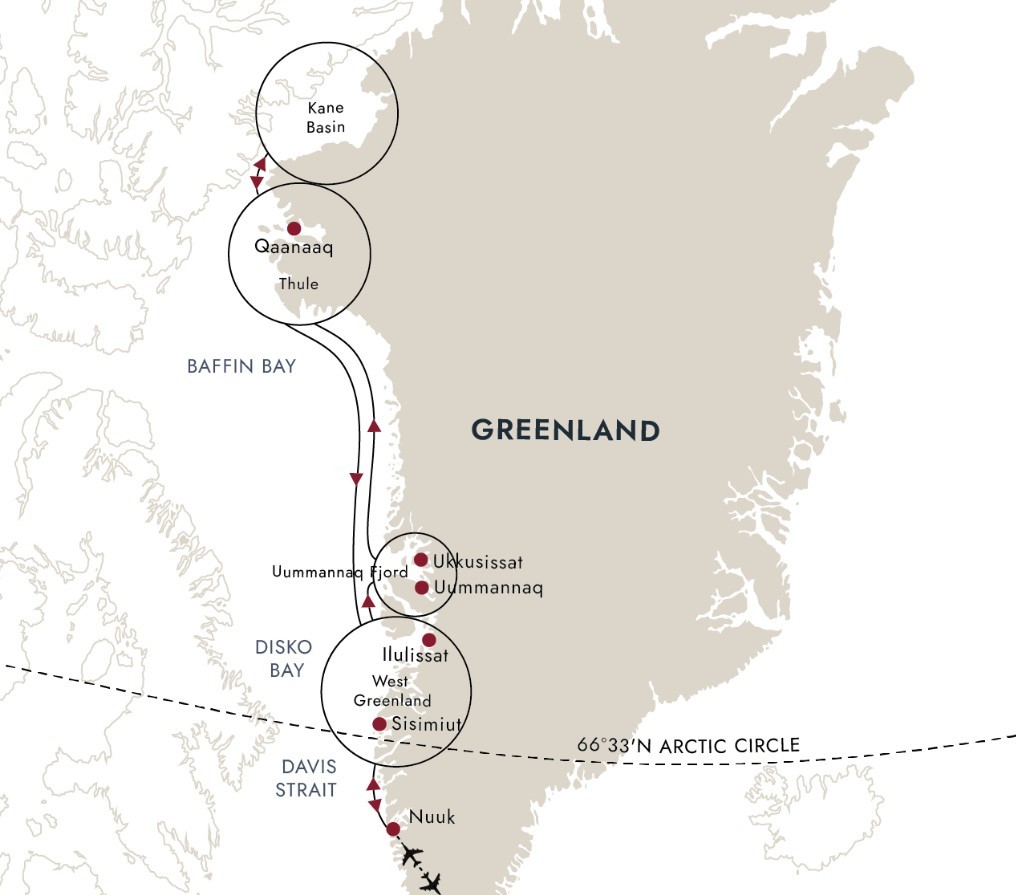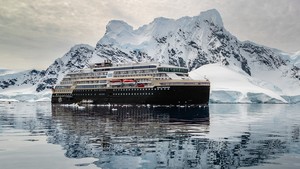
The icy waters of Disko Bay and beyond
We set out north from Nuuk along the rugged and breathtaking coast of west Greenland. See immense icebergs from tidewater glaciers in Disko Bay, including Sermeq Kujalleq, the gigantic glacier at the head of UNESCO-listed Ilulissat Icefjord. As we sail, we’ll be on the lookout for whales.
Hit the North – adventure beyond the ordinary
We’ll explore as far north as we can get, taking in the Kane Basin and the region known in legend as Thule. It’s a pure expedition voyage to the northern limit of the world. The only constraints will be the weather conditions, the sea ice and the time available. Expect Arctic uncertainties, cold adapted wildlife, ice choked waters and the coolest summer on Earth..
- Join an expedition cruise to northwest Greenland on an epic ‘farthest north’ attempt to explore the seldom-visited Kane Basin region.
- Visit the northernmost communities on Earth and sail beyond the human habitable world.
- Discover amazing scenery and arctic wildlife, and enjoy the chance to spot walruses, narwhals, belugas, and polar bears.
- This voyage begins and ends in Nuuk with flights from/to Copenhagen. An option to fly from/to Reykjavík instead can be seen here.
Availability is always subject to confirmation. Please check with us before booking flights
There are no future departures for this trip at this stage.
Start your adventure in Denmark´s wonderful capital
Your adventure begins with an overnight stay in Denmark's capital Copenhagen.
Enjoy this stylish and compact city, packed with architectural gems, coffee shops and parks. The colourful canal district of Nyhavn is a great place to people watch and enjoy a Danish pastry.
No visit to Copenhagen would be complete without a visit to see the Little Mermaid - getting there by bike or on foot beside the waterfront is easy.
Welcome to the capital of Greenland
You'll have an early start today as we depart Copenhagen and fly to Nuuk.
Nuuk is Greenland’s colourful and compact capital. With a population of fewer than 20,000, it’s a striking mix of old and modern buildings. If you’re more a fan of the former, head down to the old part of town by the waterfront, where you’ll find Nuuk Cathedral and the statue of Hans Egede standing on a hill. In the water below, you’ll see the beautiful Mother of the Sea statue – a striking juxtaposition between the two.
Your expedition ship awaits you in the harbour. After being welcomed aboard and collecting your complimentary expedition jacket, it's time to settle into your cabin and enjoy your first dinner aboard.
Getting ready for adventure
Sailing towards the Arctic Circle you’ll have time to get acquainted with the AECO rules and recommendations regarding operations and landings in the fragile Arctic environment. Make sure you attend these mandatory presentations if you want to join planned landings as we head north.
You will also have time to settle on board, enjoy the state-of-the-art ship facilities and join the first lectures on Greenland related topics, including the Citizen Science projects run on board the ship.
At some point during the sailing, we will cross the Arctic Circle, entering the lands of the Midnight Sun at the height of summer.
See the jaw-dropping beauty of nature’s artworks
Today we reach Disko Bay – a haven for whales and other wildlife. The waters here are scattered with icebergs in many shapes and sizes, and they all come from one place – the Ilulissat Icefjord. This spectacular UNESCO World Heritage Site regularly tops the list of things to see and do in Greenland, and today you'll find out why. Enjoy the scenery as you walk along the wooden gangway to the breathtaking ice fjord.
Marvel at giant icebergs floating placidly in the deep blue waters as they take on different hues of white, grey and blue. All photographers, regardless of skill, will return to the ship with the most enviable images. Back in pretty Ilulissat, visit the Icefjord Centre to learn more about the ice in this fascinating area and take a hike to Sermermiut to drink in the incredible views.
Entering through the gateway to the north
Beyond the Nuussuaq peninsula, distances start to mean everything, because it’s here that Greenland’s ‘Far North’ begins. At this latitude life proceeds at a slower pace. Weather and ice conditions run the show, and any successful landing that we attempt depends on the ability of the Captain to safely navigate waterways – especially when a summer fog descends. All in all, it’s the perfect setting for our expedition.
The beauty of the land and the relative productivity of the environment here have attracted people since the first settlers came down the coast more than 4,000 years ago. Intriguing archaeological sites are mute witness of the ability of Arctic people to thrive in such a harsh environment. It is from this area that the famed Qilakitsoq mummies were discovered.
Potential activities around here include calls at small communities such as Uummannaq – a beautiful island town with a heart-shaped mountain – or Ukkusissat. We may visit the archaeological site of Qilakitsok, go on nature landings, or attempt ice cruising in the inner fjords with our small expedition boats.
Relax and learn at sea
We’ll spend the day on the open seas crossing Melville Bay. This is a huge bay bordering the icy coast of Lauge Koch, where the ice caps meet the sea. Known by the locals as Qimusseriarsuaq, meaning ’The Great Dog Sledding Place‘, the bay was renamed by British explorers after Robert Dundas, 2nd Viscount of Melville in the mid-19th century.
Enjoy your day as we sail well beyond 70 degrees north. Relax on board, join in with wildlife watches out on deck with the Expedition Team, and learn more about the Arctic with the ongoing series of lectures on topics such as nature, geology and mythology.
Exploring Thule and the Kane Basin
From now on, we’ll be exploring as far north as we can get, taking in the Thule and Kane Basin regions.
The ‘farthest north’ has been a magnet for polar explorers ever since the North Pole became known to Arctic travellers. For decades, this abstract latitudinal concept became the measure of success for many northbound expeditions. High latitude records were achieved elsewhere until Captain Nares sailed past Thule and opened the path to the pole itself.
Explorers like Elisha Kane, Adolphus Greely, Robert Peary, and Frederik Cook also came that way and guaranteed for themselves a name in polar history and on Arctic maps. During the next week we will be sailing in their wake.
Ice and weather permitting we will explore the Thule region of northwest Greenland, cross the Smith Sound into Kane Basin, and make our way towards the Nares Strait between Greenland and Ellesmere Island. How far north we will get is entirely dependent on the ice conditions we encounter.
You’ll witness the raw beauty of the High Arctic well beyond the human inhabitable world. With a year-round extreme climate, changeable sea ice conditions, and poorly charted waters, we’re guaranteed to face challenging sailing conditions that are only within the reach of modern expedition vessels like MS Fridtjof Nansen.
On our way north we aim to visit local communities, go on nature landings in our expedition boats, sail through icy channels, and – with a bit of luck – spot some of the giants of the Arctic, including walruses, orcas, narwhals, belugas, and perhaps even polar bears.
Relax as we sail south again
We are now sailing south again, our adventures in the north completed. Days at sea are the perfect time to relax on board, perhaps chatting with new friends in the Expedition Lounge & Bar, catching up on any lectures you may have missed and enjoying leisurely lunches. If you haven’t tried the hot tubs yet, now’s your chance. There’s something magical about bathing in warm water as icebergs drift past!
Out on deck, the Expedition Team will keep their wildlife watch every day, and guest lecturers will continue to reveal new and interesting information about Greenland, the Arctic and other topics related to our voyage. Feel free to join in with any of the Citizen Science projects that are running – they’re engaging and fun, and you’ll be contributing something useful to global research.
Visit modern towns on the edge of the wilderness
The central west coast of Greenland is a land of contrasts, home to some of the longest fjords in the country and a sprinkling of settlements, including the second-largest town on the island. However, the vastness of the land makes this stretch of the coast a sparsely-populated region, where huge distances are the norm, and the sense of remoteness and isolation is just a part of daily life.
On our journey south we’ll visit communities where traditions are still alive, including Sisimiut, which lies 25 miles north of the Arctic Circle. The modern town has grown up alongside very ancient remains that date back to more than 4,000 years. If you want to learn more about the ancient Saqqaq culture, make sure to visit the interesting local museum. If you're looking for a special souvenir, pick up a scarf, hat or mittens made of qiviut, the inner wool of a musk ox, said to be 10 times warmer than sheep wool.
A small capital in a grandiose setting
Today, as we arrive at Nuuk, you will say a fond farewell to MS Fridtjof Nansen, her crew, the Expedition Team and the new friends you will have made. The lively capital of Greenland is a metropolis compared to all other towns in the country you have visited over the last couple of weeks. If you have time before flying back home, it is a fascinating window onto modern Greenland.
From here, you'll catch an overnight flight back to Copenhagen, taking with you a wealth of fantastic memories that will no doubt endure.
Take another look at Denmark´s capital
Your adventure concludes in Copenhagen, giving you another chance to explore this city.
Perhaps you will have gained a new insight into the how the histories of tiny Denmark and huge Greenland are intertwined. If you have time, perhaps you can explore the parts of city you may have missed before your trip. Copenhagen has some fine beaches not too far from the international airport, if you fancy a dip before heading home.
Itineraries are subject to change.
Fridtjof Nansen

| Max passengers: | 530 |
|---|
Fridtjof Nansen is a small cruise ship specifically designed to be one of the most sustainable ships that can visit the Polar regions.
Launched in 2020, The state of the art vessel features new and environmentally sustainable hybrid technology that will reduce fuel consumption and show the world that hybrid propulsion on large ships is possible.
MS Fridtjof Nansen is the second of two hybrid ships to be launched cutting emissions by sailing with electrical propulsion. Hybrid technology, combined with the advanced construction of the hull and effective use of electricity on board will reduce fuel consumption and CO2-emissions on the ships by 20 percent.
The future of shipping will be silent and emission free. MS Fridtjof Nansen will lead the way towards an even more sustainable way of traveling. Sailing on electrical power is not only a great benefit for the environment, but it will also enhance the impact of experiencing nature for the guests. The ship will be specially constructed for voyages in polar waters and serve as a comfortable basecamp at sea – bringing adventurers from all over the world to the most spectacular destinations in the most sustainable way.
These ships combine state-of-the-art technology together with a premium onboard experience. All cabins are outside, half have private balconies, and aft suites even boast private outdoor Jacuzzis, to soak up the stunning scenery in style.
Facilities on board
One of the most eye-catching exterior design features of the ships will be the two-level indoor/outdoor Observation Deck wrapped around the top of the ships’ raked bow. In a vast area behind it, you’ll find the core of the onboard experience: Amundsen Science Center.
Packed with state of the art technology and high tech gadgets such as touch screens and science equipment, the immersive edutainment area will be the place guests and staff/crew meet, mingle and create a deeper understanding for the areas they explore. The flexible venue will feature lecture spaces, a small library, and speciality areas for workshops in photography, biology, and more.
The stunning scenery will be reflected in a rich and comfortable interior design. Scandinavian materials from nature, such as granite, oak, birch and wool will be used to create relaxed and stylish cabins and public areas. All cabins are outside, 50 % will have private balconies, aft suites will feature private outdoor Jacuzzis with spectacular views.
Deck plans are for illustrative purposes only – The actual ship and cabin layout may differ.



